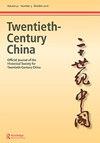Top Secrets Revealed: The Political Ambitions of China's Last Emperor, 1933–1937
IF 0.4
Q1 HISTORY
引用次数: 0
Abstract
Abstract:Using the documentation of secret meetings recorded by Hayashide Kenjirō, "Genpi kaiken roku," this article analyzes the political ambitions of the last emperor of China, Puyi. The image of a puppet clings to Puyi, the leader of Manchukuo, as does the opinion that he planned to utilize the Japanese to revive the Qing dynasty. I challenge these notions. This article deems Puyi a more ambitious and autonomous individual who primarily identified with Japan's imperial projects in China Proper. Chronologically analyzing Puyi's conversations with the Kantō Army's four supreme commanders between 1933 and 1937, I argue that Puyi's desire for autonomous power and a lack of good information from the outside world motivated his support of Japan's expansion in China and prompted him to identify Manchukuo's interests with Japan's. Puyi frequently influenced Manchukuo's policies, confirming that his political role was more prominent than many have imagined.揭秘:中国末代皇帝的政治野心,1933-1937
摘要:本文利用Hayashide Kenjirō记载的秘密会议的文献《根皮开府录》,分析了中国末代皇帝溥仪的政治野心。傀儡的形象紧紧抓住了满洲国领导人溥仪,他计划利用日本人复兴清朝的观点也是如此。我对这些观念提出质疑。本文认为溥仪是一个更具野心和自主性的人,他主要认同日本在中国本土的帝国主义计划。从时间上分析溥仪在1933年至1937年间与康德军四位最高指挥官的谈话,我认为溥仪对自治权的渴望和缺乏来自外部世界的良好信息促使他支持日本在中国的扩张,并促使他将满洲国的利益与日本的利益相一致。溥仪经常影响满洲国的政策,证实了他的政治作用比许多人想象的要突出。
本文章由计算机程序翻译,如有差异,请以英文原文为准。
求助全文
约1分钟内获得全文
求助全文

 求助内容:
求助内容: 应助结果提醒方式:
应助结果提醒方式:


